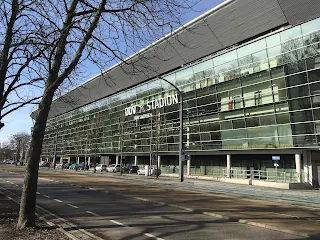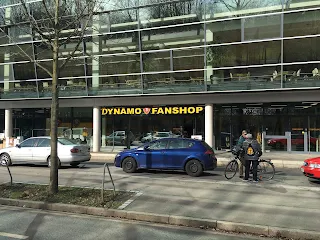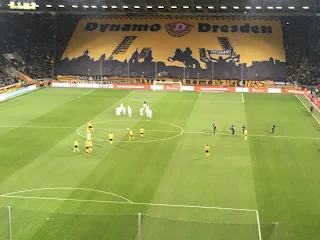Sportgemeinschaft
Dynamo Dresden eV, or SG Dynamo Dresden, or plain Dynamo Dresden, as they are
more commonly known, is a professional football club from the city of Dresden,
which is located in the southern German state of Saxony. The club was
formed in 1953.
Dresden had previously been a prominent city in German football
before World War II, with Dresdner SC being champions on a couple of occasions
during hostilities. The occupying Allied forces disbanded all former sports clubs in 1945. Dresdner SC were reformed as SG Friedrichstadt, but were disbanded in 1950.
The city needed a new representative in the new East German Republic. A new club
came about as part of the police SG Deutsche Volkspolizei
Dresden. Players were brought in from other police forces around the state.
They won the FDGB-Pokal East German Cup in 1951-52 with a 3-0 victory over Einheit
Pankow.
The new central sports society, SV Dynamo, was formed in April 1953. Volkspolizei were affiliated to the society and took up the name SG Dynamo Dresden, with the team being crowned as East German DDR-Oberliga champions in 1952-53.
The title win was an
embarrassment for Erich Mielke, head of the Stasi, who wanted East Berlin to
have the dominant team in East German football. Under his orders, the Dynamo
team, including internationals Johannes Matzen, Herbert Schoen and Günter
Schröter, were moved to the capital to form Berliner FC Dynamo.
SG Dynamo Dresden were left with a squad of youth and reserve team players, having to regroup in the second-tier DDR-Liga. By 1957, they had been relegated to the fourth-tier local Bezirksliga. By 1962, they had climbed back to the DDR-Oberliga, but their spell in the top flight lasted just one season.
Once again, the club fought
back and won promotion straight back to the Oberliga. Another demotion came at
the end of the 1967-68 season, but once more, top division status was regained
at the first attempt.
Walter Fritzsch took over as team manager in June 1969 as Dynamo embarked on a successful era. They were crowned as champions in 1970-71 thanks to the goals of Hans-Jürgen Kreische before completing the double with a 2-1 victory after extra time against Berliner FC Dynamo.
Wins over SK VÖEST Linz, Ruch
Chorzów and F.C. Porto saw Dynamo reach the quarter final of the UEFA Cup in
1972-73 before they went out 3-0 on aggregate to eventual cup winners Liverpool
before going on to lift the league title at the end of the season.
Following a couple of third-place finishes and final appearances in the Pokal, Dynamo were crowned as champions once again in 1975-76. Wins over ASA Târgu Mureş, Budapest Honvéd FC and FC Torpedo Moscow saw the team reach the last eight of the UEFA Cup once again before Liverpool once again ended the run.
Dynamo retained their league
title in 1976-77 as well as defeating Benfica and Ferencváros before going out
to FC Zürich at the quarter-final stage of the European Cup. A 3-2 victory over
FC Lokomotive Leipzig in the final of the FDGB-Pokal completed another double
as attendances around 27,000 continued to flock to Dynamo-Stadion.
Fritzsch’s successful reign came to an end as Dynamo completed a hat trick of league triumphs of 1977-78. He was replaced by Gerhard Prautzsch, who led the side to the last eight of the European Cup in 1978-79 following wins over Partizan Belgrade and Bohemian of Dublin.
Three runners-up league
finishes were attained before Dynamo added their fourth FDGB-Pokal with a
penalty shootout defeat of Berliner FC Dynamo in 1982, with the goals of Ralf
Minge being a contributory factor. Further FDGB-Pokal wins came in 1984 and 1985, following 2-1 and 3-2 wins in the finals over Berliner FC Dynamo.
Torsten Gütschow’s goals led Dynamo to their seventh Oberliga league title in 1988-89. Dynamo reached the semi-finals of the UEFA Cup following wins against Aberdeen, KSV Waregem, AS Roma and Victoria Bucureşti before they bowed out to VfB Stuttgart.
The title was retained the
following season as Dynamo’s third league and cup double was completed with a
2-1 win against Dynamo Schwerin. The 1990-91 season was spent in NOFV-Oberliga,
the last of the old East Germany, before Dynamo were placed in the Bundesliga
following unification.
After three seasons in the lower third of the league table, Dynamo finished in bottom place in 1994-95 and were relegated to the third-tier Regionalliga Nordost due to financial irregularities preventing them from competing in the 2. Bundesliga. The club went through three managers during the disastrous campaign: Sigfried Held, Horst Hrubesch and Ralf Minge.
Following further league
re-organisation, Dynamo were demoted to the fourth-tier Oberliga Nordost-Süd
for the 2000-01 season. The goals of Denis Koslov led Dynamo to the 2001–02
NOFV-Oberliga Süd title before victory over Hertha BSC II in the play-off led
the club back to Regionalliga Nord.
As 1. FC Dynamo Dresden, the club finished as runners-up of Regionalliga Nord in 2003-04 to secure second-tier football once again. After a spell of two seasons, Dynamo went back down to Regionalliga Nord.
3. Liga took over as the third
tier in 2008-09, with Dresden one of the clubs, as Stadion Dresden or DDV-Stadion was renovated and reopened. Dynamo finished the 2010-11 season in third place
before sealing promotion with a 4-2 aggregate win against VfL Osnabrück.
The 2013-14 season was another of misery for Dynamo. The team were relegated and banned from competing in the DFB Pokal following crowd trouble at a match the previous season. Coach Peter Pacult was replaced by Olaf Janßen, who could not keep the team up.
Justin Eilers was the top scorer
in 2014-15, but his goals could only take Dynamo to a sixth-place finish in 3.
Liga. However, it was a different story in 2015-16 as the team lifted the third-tier title under head coach Uwe Neuhaus, as average home gates were over 27,000.
Dynamo consolidated in their first season back in the second tier as the crowds continued to flock to DDV-Stadion. Stefan Kutschke scored the goals in 2014-15 that led the side to a fifth-place place 2. Bundesliga finish in 2016-17 before dropping down to twelfth in 2017-18.
The same place was achieved in 2018-19 as Dynamo changed coaches four times, including a couple under Cristian Fiél, who remained in charge until December 2019 when Markus Kauczinski took over. His side sat bottom of the 2. Bundesliga table when the COVID-19 pandemic halted proceedings.
Dresden were somewhat penalised after the restart, after a positive test for the virus at the club saw a delay in fixtures that were then scheduled with little rest, as the team were relegated. As ever, the club fought back, with Dynamo lifting the 3. Liga title with Christoph Daferner providing the goals in 2020-21.
However, the team went back down twelve months later after the new team trainer, Alexander Schmidt, had been replaced by Guerino Capretti. SG finished sixth and then fourth under Markus Anfang before a runners-up spot in 2024-25 as Daferner again provided the ammunition which led to promotion for the side trained by Heiko Scholz and then Michael Stamm.
SG Dynamo Dresden will play in the 2. Bundesliga in the 2025-26 season.
My visit
SG Dynamo Dresden 3 1.FC
Kaiserslautern 3 (Friday 3rd March 2017) 2. Bundesliga (att: 28,907)
My visit to another iconic
European city was going particularly well. I’d briefly travelled through
Dresden sixteen years earlier by train on the way to Berlin from Prague, and it
had looked very pretty, but I hadn’t expected such wonderful architecture,
reconstructed or otherwise.
Following a nice sightseeing
walk in the old town, I decided to have a walk to the DDV-Stadion during
daylight to get a few photos and to plan a smooth experience later that
evening. The pleasant walk took me to Helmut-Schön-Allee, named in honour of
the German World Cup-winning manager who hailed from Dresden.
I wandered around down Lennéstraße
past the offices and club shop built into the stand where the TV company were
readying itself to cover the match. I found my required turnstile block for
later before taking a number 10 tram towards Heinz-Steyer-Stadion.
Later in the day, I was
refreshed following a fine lunch and then a siesta before enjoying a pre-match
beer at Cafe Happening, before taking an 11 tram to Lennéstraße. I thought I’d
given myself plenty of time, but the crowds were already large outside.
Fortunately, the heavy searches
were done efficiently, and I was soon inside the courtyard behind the stand with
time to purchase food, drink and a programme from one of the pop-up club shops.
My entrance was straight in front, and I found my lofty seat, which offered a
magnificent view for €24. I had printed my ticket at home to save on postage.
The first thing that hit me
was the show put on by the ultras at the far end with their huge banner, and
then silence for a few seconds before breaking into a wall of noise. The
atmosphere was right up there with St Pauli as one of the best I’d experienced
anywhere. Everyone got behind their side on all four sides of the modern arena.
DDV-Stadion was nothing out of
the ordinary from an architectural point of view, with its single steep tier all
the way around. The far end was terraced, along with a corner section along from
me for away fans. The main side had corporate facilities inside it. What it
definitely did have was superb acoustics.
The match turned out to be an
absolute cracker. Dynamo started off on the front foot, but it was
Kaiserslautern who took the lead when the ball wasn’t cleared, and Robert
Glatzel steered the ball home. He doubled the visitors' lead after twenty-seven
minutes with a fine shot as the Dynamo central defenders dallied.
While the home fans were less
than happy, they still got behind their team. The noise was unbaiting. Dynamo
were soon back in the game when a cross from Giuliano Modica was fired home by
Manuel Konrad just past the half-hour mark.
Dresden pushed for an
equaliser. Aias Aosman saw his shot saved by Lautern keeper Julian Pollersbeck.
Aosman fired the rebound towards the goal, but defender Naser Aliji cleared off his
own line.
Just as the game entered
stoppage time at the end of the first period, Dynamo were given a penalty when
referee Robert Hartmann decided that defender Ewerton had held down the
impressive home striker Stefan Kutschke illegally. Kutschke kept his nerve from
the spot and fired home to send the teams in at 2-2 at halftime.
At the interval, I went for a
quick top off of food as I had post-match plans revolving around some beer. The
queues were long, but the staff were efficient as at most German grounds.
With just thirteen minutes
remaining, Dynamo’s gradual dominance bore fruit when Aosman saw his shot come
off the chest of Pollersbeck. Kutsche was on hand to slot the ball home as the
DDV-Stadion went berserk.
Kaiserslautern were not to be
denied. Marcel Gaus broke away with three minutes to go. His pass found
substitute Kacper Przybyłko. The Pole’s shot from twelve yards went in past home
keeper Marvin Schwäbe to make the score 3-3. Lautern had a shot that came back
off the crossbar in added time.
As soon as the full-time
whistle blew, I ran as quickly as possible and took the first tram towards the
central station, from where I took an 11 tram to Albertplatz, and then walked along Bautzner
Straße to Hoyerswerdaer Straße, where I entered
the recommended Zum Bautzner Tor. The bar was like a relic from
the former communist era in the city, with plenty of old memorabilia on show.
My reason for my visit was the range of beers. Sven, my German Twitter pal, had
come up trumps again by reaching out to his contacts for advice. There were five different
types of beer on draught, and all were of a sensible strength. Three of the beers
on offer were from the local Neustadter Hausbrauerei, with the other two being
Czech in origin.
I got a stool at the bar, and
the service was helpful and friendly. The place was already busy, but gradually
the Dynamo fans were arriving. It became so busy that some were turned away. I
went along the range and then chose my favourite for a second helping.
My train the following morning
necessitated a 5am alarm call. I should have really headed home, but
instead I went to the Shamrock Pub opposite the Ibis Hotel where I was staying.
I’d used the pub the previous evening and enjoyed the dunkel beer. I’d had the
taste and had at least one too many.
The following morning, I caught
the train to Berlin and then to Schönefeld for my flight back to Luton in time
for my Saturday afternoon at Hendon. I’d loved every minute in Dresden, and the
Dynamo match was simply the icing on the cake. Highly recommended.






















No comments:
Post a Comment